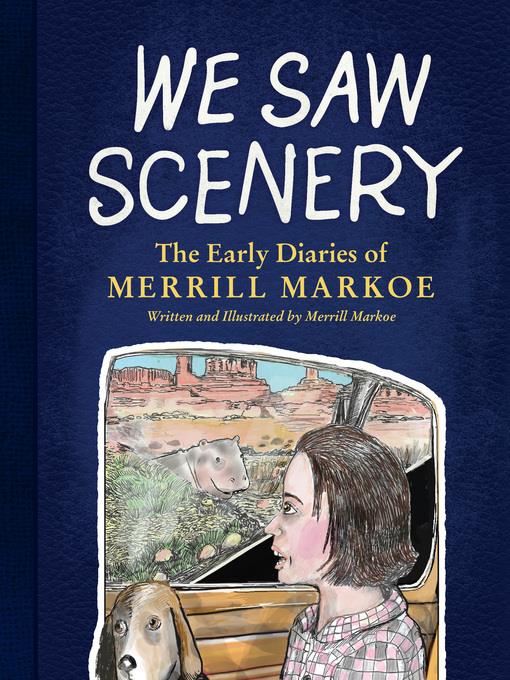
We Saw Scenery
The Early Diaries of Merrill Markoe
کتاب های مرتبط
- اطلاعات
- نقد و بررسی
- دیدگاه کاربران
نقد و بررسی

August 31, 2020
Comedian Markoe (What the Dogs Have Taught Me) spins a spiky coming-of-age memoir combining commentary, comics, and diary excerpts in a scrapbook fashion. Markoe’s girlhood journal begins in 1958 when her bankrupted father moves the family to Miami. Watching too much TV and striking out with boys because “I was getting all my romantic advice from Mad magazine,” Merrill cultivates the snarky sense of humor crucial to her future career. The family moves to California for her teenage years, and she plunges into 1960s counterculture: discovering art, reading Kerouac and Sartre, and crushing on John Lennon while fantasizing that he would agree with her that sex sounds boring. Throughout, the adult Markoe meditates on the mechanics of memory and talks to her younger selves, wondering if “the original-recipe version of me in grade school would remind me of the geezer version.” Markoe’s wit is hampered by her uneven, ugly-cute drawings. They have the sardonic edge of alternative cartoonists like MK Reed, but Markoe has trouble assembling them into layouts, as images fight text for page space and word balloons sprout awkwardly. Even so, Markoe’s knack for anecdotes and perfect turns of phrase (“My dad thought having a personality was an optional feature”) is worth the price of admission. Fans of Roz Chast and Mimi Pond will want to take a look.

September 1, 2020
An Emmy-winning comedy writer's graphic memoir about her odyssey into diaries she kept as a young girl growing up in the 1950s and '60s. When Markoe began looking through her girlhood journals, she writes, "I was amazed at how much it felt like I was reading about a stranger." She discovered long-forgotten--and sometimes painfully embarrassing--entries detailing the minutiae of her daily life, such as a weight-loss recommendation from her doctor that sent her "spiraling into a lifetime of obsessive dieting." More significantly, she encountered the outlines of her developing self: a girl "steeped in pop culture" who considered the TV her "best friend" and routinely fought her one-time "relentless adversary," her brother. With a mixture of mortification and amusement, Markoe observes how her younger self faithfully recorded such events such as the Cuban missile crisis alongside those involving a string of unrequited loves that began in the fourth grade. During one especially hilarious romantic mishap, Markoe interpreted a Nazi salute a crush gave her as a sign of his undying affection. "On the cusp of 15," she left Florida for San Francisco with her family. As the new girl, she quickly developed survival strategies that "put me at war with my parents." Teenage angst eventually drove her to seek refuge in art, her diary, and humor, which she used to combat tensions with her parents that she did not escape until she went to the University of California at Berkeley. Markoe's bold, sometimes absurdist drawings and the often chiding conversations she imagines between her mature and adolescent selves enhance the comedy at the heart of this thought-provoking story about what happens when the wisdom of age confronts the follies and foibles of youth. "I wish I could say I became smarter about handling love relationships," she writes near the end, "but a lifetime consumption of books and movies had taught me some very bad ideas about how it was all supposed to work." A memoir that is both relatable and subversive.
COPYRIGHT(2020) Kirkus Reviews, ALL RIGHTS RESERVED.

October 1, 2020
Comedian Markoe (What the Dogs Have Taught Me) combines text, illustration, and scans of the diary she kept as a preteen and teenager in this coming-of-age memoir that doubles as a meditation on the nature of memory. Opening in 1958, as her family relocates to Florida from New Jersey following her father's business going bankrupt, Markoe supplements early entries providing bare-bones recollections of daily life with droll commentary from her present perspective. As a teenager, Markoe's obsession with popular culture and yearning for romance finds her opening a roadside psychiatric stand (� la Lucy van Pelt of Peanuts) in hopes of engaging boys in conversation; as the memoir progresses into the 1960s, she rages at her fellow Beatles fans for screaming too loudly during a concert, becomes interested in Sartre, Bob Dylan, and politics, and develops her idiosyncratic voice and worldview. VERDICT Markoe's reflections and interrogation of her memories are hilarious and presented with a surrealistic flair in scenes depicting everything from an interview of a hippopotamus representing her own hippocampus to a commiserating of her modern and adolescent selves.
Copyright 2020 Library Journal, LLC Used with permission.

























دیدگاه کاربران